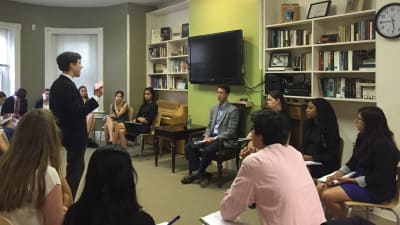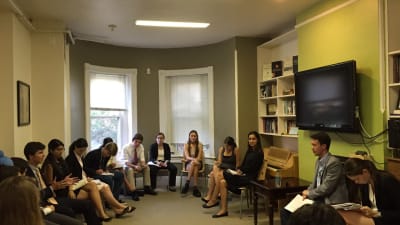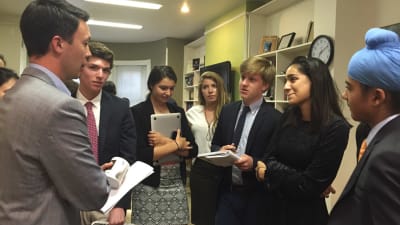Summer 2016 presents policy document to White House expert
What is it like to testify before Congress? To argue a case in front of the Supreme Court? In the final days of the Summer 2016 semester our students got a taste when they presented their capstone policy document to a leading White House expert on cyber warfare.
The capstone collaborative policy document is one of SEGL’s most difficult challenges. Each SEGL cohort must select a current international crisis, research that crisis and collaboratively craft a 40-page scholarly document which is then presented and defended in front of real-world policymakers.
This summer chose Iranian cyber warfare against the United States as its topic. After making this decision, the students split into five sub-groups, each with a different area of expertise. The groups overviewed the current situation and drafted specific practical recommendations.
The students then spent a day in the George Washington University main library, with full access to the University’s resources. David Ettinger (the top international relations/political science research librarian at GW), who has been a student favorite since our first semester, starts with an entertaining orientation session so that the students know how to use the myriad databases in the GW system (this is also good preparation for undergraduate life!), and then the students are off to the many corners of the building.
After compiling their research for several days, the students create rough drafts that are critiqued (often mercilessly!) by our faculty. They discuss, disagree, research, and revise, and then it is time to present. Each semester we try to meet with on-the-ground policymakers who have the ability to incorporate our students’ ideas into actual policy.
This semester we welcomed Trevor Rudolph, the senior White House cybersecurity advisor responsible for revolutionizing the state of Federal cybersecurity. Rudolph is responsible for advising the U.S. Chief Information Officer and White House leadership on Federal cybersecurity policy, programs, and threats. (His official title is Chief of E-Gov Cyber and National Security Unit at the White House Office of Management and Budget.)
Often we visit our expert’s place of business, but the White House’s cyber security offices are off limits to visitors (!) so Rudolph came to our Academic building. For the better part of two hours, Rudolph listened, prodded, complimented, and challenged our students, engaging them in a provocative and meaningful exchange. He stayed after his allotted time to answer a flurry of student questions. (We wish we could report more details of the meeting, but of course it was off-the-record. Check with one of our students to get more information!)
The students afterwards were excited (and relieved!). They had done the research and had the preparation to engage in a real conversation about a sophisticated current issue with arguably the leading cybersecurity expert in the Federal government. What an accomplishment!
Want to read the document for yourself? You can download it here.












